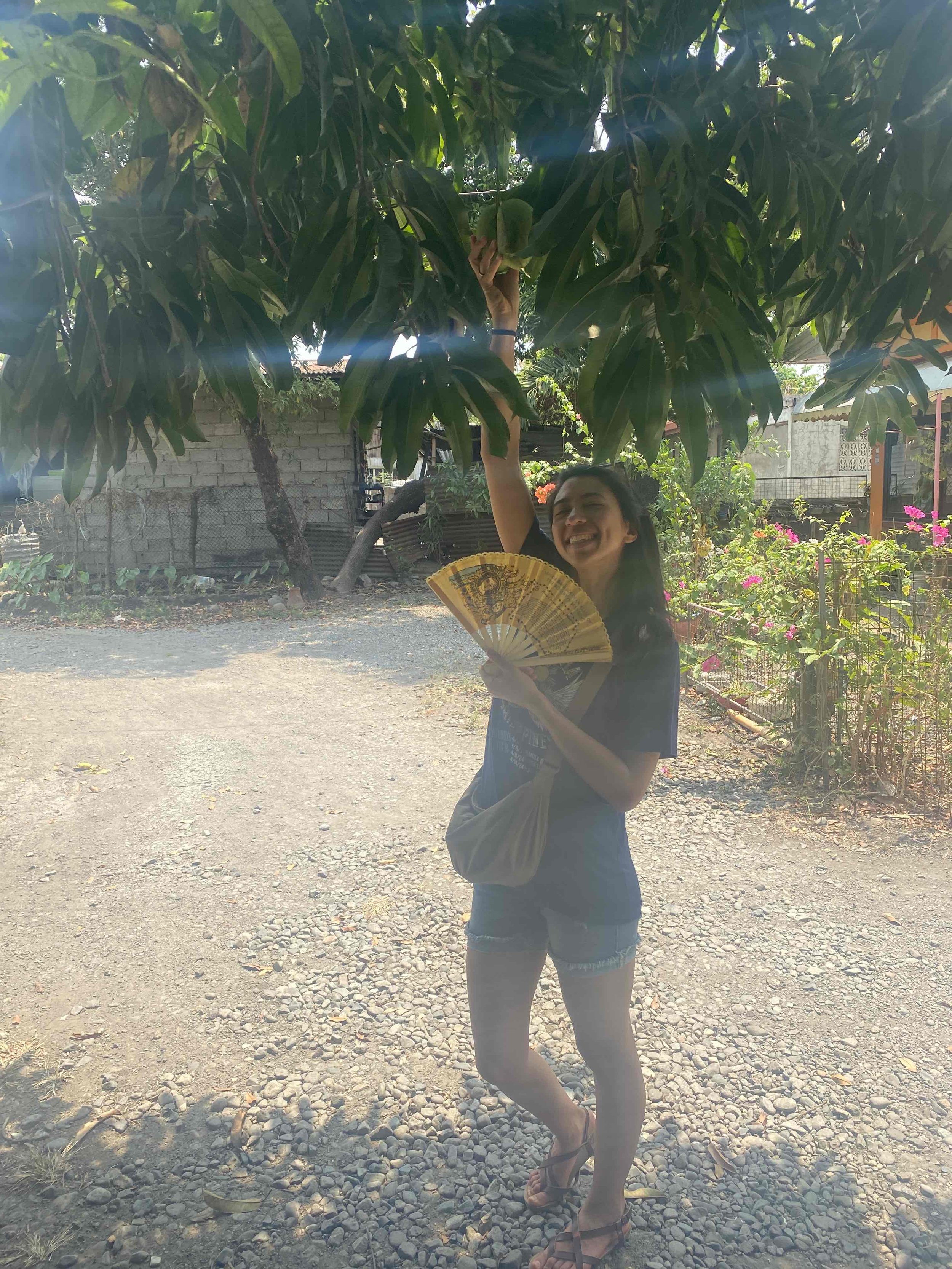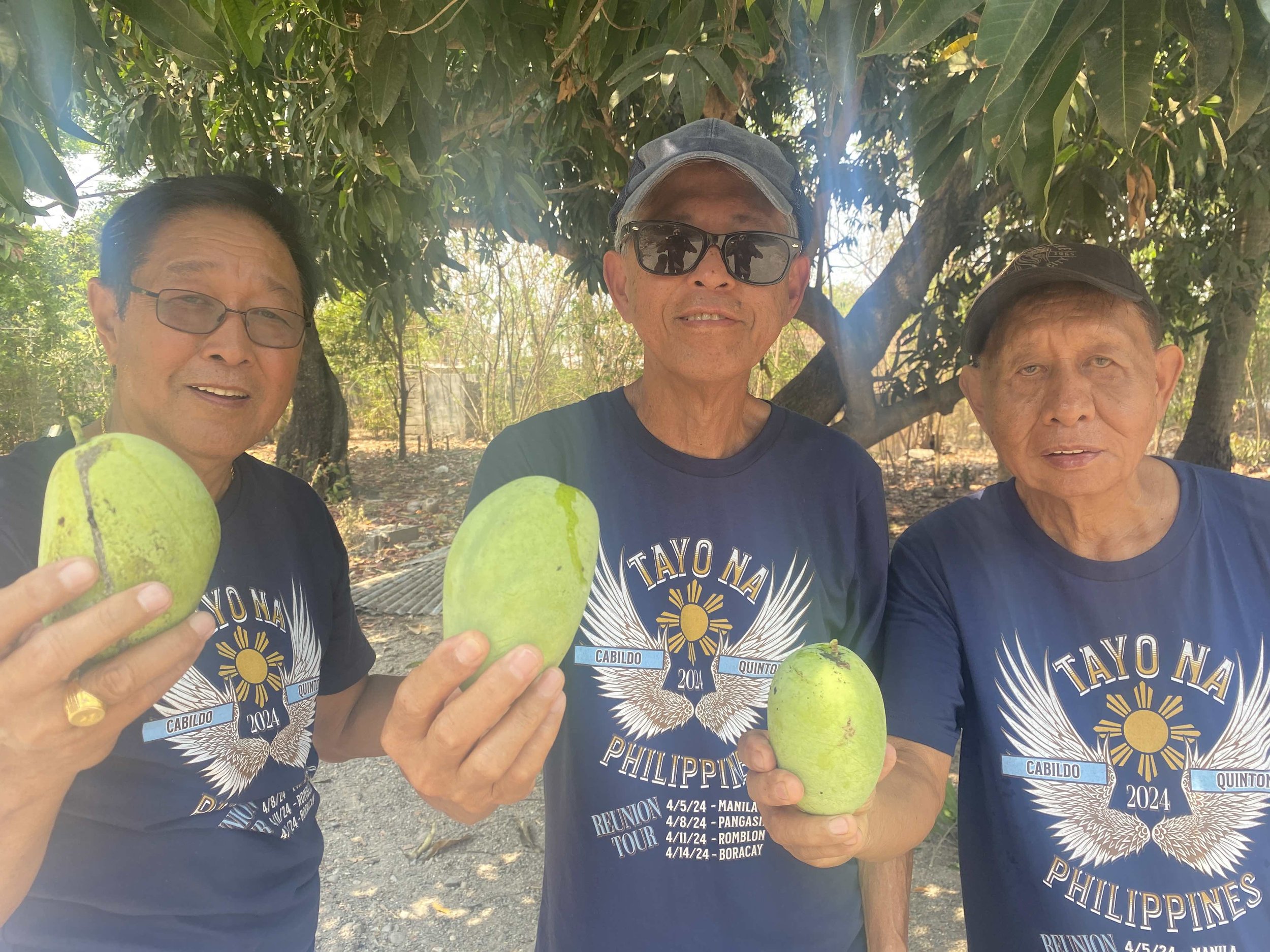Lessons from Ancestral Land 🥭
Hi friends,
I've been in the Philippines with family this month, and it's been non-stop traveling, family get togethers, and of course, lots of eating. A few days ago, my husband and I said goodbye to my parents, cousin and her husband, and our little 6 year old niece, to make our way to El Nido in Palawan for the last leg of our journey. Here's the view from our room. I hope it eases your nervous system a bit ☺️.
I actually started the draft to this email while in Pangasinan last week, but wasn't able to finish it. Being in the birthplace of my father, a place he hasn’t been back to in over 50 years, during the solar eclipse was a bit of a doozy. I don't follow astrology that closely, but everything surely felt amplified.
Our trek to Pangasinan started when we met up with my two uncles and aunts in Manila, and we all clambered into a van for the three hour drive north. Tito Stanley also lives in the United States, but him and his wife, Tita Josie, are retired and trying to do the live part-time in the Philippines thing. They've already been here for two months. Tito Fred, the oldest out of my father's brothers, has been living in the Philippines his whole life.
A few days before we got there, during breakfast at our hotel in Manila, my dad shared with me that part of the reason he wanted to come back to Pangasinan was to “square away” the land that he and his siblings own, inherited from my Lola (we called her Mamang).
By the way, he said, you could inherit my portion if you wanted.
Well, Dad, I told him, this is news to me!
Just having this opportunity to step foot on family ancestral land was already giving me all the feels. But the idea of owning land that has been in my family for generations—uh, come again? It was like I couldn't even register the concept. First, because we're all living on stolen land in the United States. The painful history and ongoing struggles faced by Indigenous peoples in America color the background of property ownership in the United States. By simply residing in the US, we all bear some imprint of this historical wound. We all have some responsibility to heal it too.
Second, we live in a prevailing culture of transiency. We move from our hometowns to college towns or we move from suburbia to the big city, and then sometimes back again. Even if we choose to stay in our hometowns, these are often places our parents chose to settle, coming from elsewhere. We relocate for jobs, to start families, or in response to a quarter-life crisis. Constantly changing where we call home has made the concept of living through generations on the same land and forming deep connections with it seem like an unfamiliar idea to me.
But what the brain can't register, the body does in some way.
When we got to Pangasinan, we visited the local church where my father said Mamang took them when they were children, where he claimed miracles happened. We visited the graves and lit candles for my Lolo Frederick, who died when he was just 36, and for a great grandmother, who I just then learned existed. She was born in 1885, and her name was Adriana. Then we drove to the small patch of land that used to have the house where my father grew up. Broken foundation of the old house is still there amongst other rubble. As my uncles chatted with the neighbor, I picked mangos off the trees.
All the land my family owns is scattered to other parts of town. Tito Fred has a mango farm on land that used to bear sugarcane. My uncles and dad bickered in Tagalog about what to do with the land now that they are all older. One uncle wants to sell it, my other uncle wants to keep it, and they both chastise my dad for only getting involved now (it’s true, this is the first time I’ve heard about it!). No one knows the exact borders of the property. It’s unclear who has the paperwork, if there is any.
I asked my uncles how long the land has been in the family, since my dad isn’t sure. They both looked at each other and shrugged: a very long time, they answered. From before my great grandmother, Adriana.
And what my brain couldn't register, my body did.
All the mixed emotions surfaced in my body around the stories that I am holding about being here. I felt my throat tighten as my chest contracted. I imagined what Mamang might have felt having to leave and raise her five kids in Manila after her husband died, wondering if she would ever return to live here again. I felt my dad's nostalgia. I felt my romanticized longing to have soil to dig my fingers in that ties me back to ancestors farther back than I can fathom. I felt joy in having so much family together on this trip, and a tender ache that recognized the aging of my parents and relatives. I felt a deep thankfulness that we could all make this journey.
Place hold memories just like the body does. And similar to how the body remembers what the mind has forgotten, land holds energetic imprints of the people who lived, loved, and resided there. I felt the approval of my great grandmother, Adriana. I thought, she likes that we're all here. I felt an anchoring to the land that felt like belonging. And at the same time, I felt sorrow that seemed like a goodbye to land I would never have the opportunity to really know or deeply care for, the way land should be known and cared for.
That this will be the only energetic imprint I'll make upon it.
In the end, my dad decided to let his share of land go, and I agreed. I understand that beyond the idealized sentimentalism of owning ancestral land—viewing it as a deeply emotional connection to our past and heritage—lies the practical and grounded reality of what it actually takes to care for it responsibly. My husband and I own a property that we we’ve spent a lot of time, resources, and effort to renovate and keep it well maintained. Homeownership is work and can be stressful, and our property is only 4 hours away.
So, what does it mean to be in a right relationship with the land?
Love and care for the land you’re on.
This might look different for a city dweller versus someone with a backyard. We might not farm or raise children on land from great grandparents, yet we can carry ancestral values with us everywhere. No matter where we are, we're tasked to find new and innovative ways to be modern stewards of the land.
Being diasporic refers to the dispersion of people from their homeland to various places. Yet, what if we reframed living in the diaspora not as a condition of loss or disconnection from our homeland, but as the very experience that has nurtured our capacity to creatively establish a sense of home and belonging wherever we find ourselves?
As we consider all the ways, new and old, that we can tend to the earth we're living on, let's recognize that as diasporic people, we all do a pretty good job of tending to community. We've been able to find home and belonging beyond ancestral land, amongst each other, within diverse communities and causes, and deep within ourselves.
We may make visits to the Philippines only a few times or many across our lifetime. We may make the Philippines our second home or never step foot on the archipelago. Yet we carry the lessons of the land within us always. We belong to the earth, no matter where we are in the world, and perhaps that's what our ancestors wish us to remember.
As we explore the art of Kali, the practice becomes a way to channel ancient wisdom because our bodies are gifts from the earth and our ancestors. I look forward to learning more about your journey in the Chrysalis Kali Collective online monthly membership program as we continue to do deep dives into all of this together. Online classes start May 7th!
💛⚔️🥭,
Guro Kristen
P.S. And here's a cute photo of my dad and uncles holding mangos to send you off with a warm heart ☺️.



